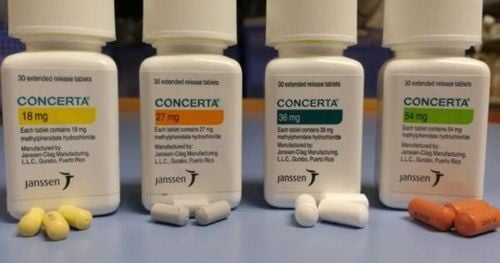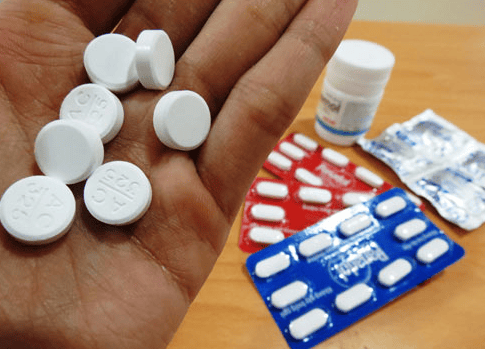This is an automatically translated article.
Tusalene medicine is prepared in the form of film-coated tablets, with the main ingredient being Alimemazine tartrate. The drug is used to combat allergies, used in cases of hypersensitivity.
1. What disease does Tusalene treat?
Tusalene medicine has the main ingredient is Alimemazine tartrate. What are the uses of Tusalene? Alimemazine is a phenothiazine derivative, with strong antihistamine, antiserotonergic, sedative and cough suppressant effects. This ingredient has a vasodilator effect, increases the vascular permeability of histamine on the capillaries, reduces or eliminates inflammatory reactions, allergies, reduces itching, reduces edema. In addition, Alimemazine also helps relieve gastrointestinal contractions, relieve abdominal pain due to allergies, inhibit the secretion of saliva, tears related to histamine, inhibit the vasoconstrictor effect of histamine. The drug also has CNS depressant effects, calming; Anticholinergic effects help antiemetic, anti motion sickness.
Indications for use of Tusalene include:
Treatment of allergic symptoms: respiratory allergies (sneezing, runny nose, rhinitis), conjunctivitis, skin allergies (urticaria, rash); Treatment of frequent vomiting in children; Treatment of insomnia in adults and children; Relieve dry cough, cough caused by irritation, especially cough in the afternoon or at night; Treatment of acute delirium due to alcohol withdrawal. On the other hand, some of the following cases are contraindicated to use Tusalene:
Patients with hypersensitivity to antihistamines; People with liver or kidney dysfunction, Parkinson's disease, epilepsy, hypothyroidism, myasthenia gravis, pheochromocytoma; Overdose due to opiates, barbiturates, alcohol; Persons with a history of granulocytosis related to phenothiazine derivatives; People at risk of urinary retention related to prostatic urethral disorders; Patients at risk for angle-closure glaucoma; Children under 2 years old; Pregnant or lactating women.
2. How to use and dose of Tusalene
The drug is in the form of tablets and is taken orally. The patient should swallow the tablet whole with water, do not chew or crush the tablet. Depending on the condition of the disease, age, but the doctor will have different indications. Specifically as follows:
Dosage for treatment of urticaria, itchy papules:
Adults: Take a dose of 2 tablets of 5mg x 2-3 times/day. For persistent, difficult to cure cases, the dose is 100mg/day; Elderly people: Take 2 tablets of 5mg x 1-2 times/day; Children over 2 years old: Use dose 2.5 - 5mg x 3 - 4 times/day. Dosage of antihistamines, antitussives:
Adults: Take 1 - 2 tablets of 5mg x 3 - 4 times/day; Children over 2 years old: Use dose 0.5 - 1mg/kg/day, divided into several times. Dosage effect on sleep, take 1 time before going to bed:
Adults: Take a dose of 5 - 20mg (1 - 4 tablets); Children over 2 years old: Use dose 0.25 - 0.5mg/kg/day. Dosage for treatment of acute alcohol delirium (agitation): Adults use a dose of 50-200mg/day.
In the event of an emergency or an overdose of Tusalene with dangerous manifestations, the patient should be called for an ambulance and taken to the hospital immediately. Overdose symptoms include: Drowsiness or loss of consciousness, increased heart rate, hypotension, ECG changes, ventricular arrhythmias, hypothermia, severe extrapyramidal reactions,... If detected early (within 6 hours after taking an overdose) gastric lavage, activated charcoal should be used. As there is no specific antidote, supportive treatment is needed. If a dose of Tusalene is missed, the patient should take it as soon as possible. If it is almost time for your next dose, skip the missed dose and take your next dose at the scheduled time.
3. Tusalene side effects
Some side effects patients may encounter when using Tusalene include:
Common: Drowsiness, fatigue, headache, mild dizziness, thick phlegm, dry mouth, drowsiness; Uncommon: Urinary retention, constipation and eye accommodation disorders; Rare: Agranulocytosis, leukopenia, increased heart rate, decreased blood pressure, extrapyramidal symptoms, cholestatic jaundice, Parkinson's tremor, restlessness, decreased seizure threshold in epilepsy, confusion Acute dystonia, tardive dyskinesia, dry mouth can damage teeth and enamel, respiratory arrest, even sudden death. When experiencing side effects of Tusalene, patients should notify their doctor soon for timely advice and treatment.
4. Be careful when using Tusalene
Some notes patients need to remember before and while using Tusalene:
Caution when using Tusalene in cardiovascular patients; Use caution when administering Tusalene to elderly patients, especially when it is too hot or too cold (because it can cause orthostatic hypotension, constipation, dizziness, drowsiness); Tusalene should be used with caution in operators of machinery because of the risk of drowsiness; Do not use Tusalene in pregnant and lactating women, if necessary consult a doctor; Alimemazine in the drug may interfere with skin tests for allergens; Avoid taking Tusalene with alcohol or other CNS depressants.
5. Tusalene drug interactions
Drug interactions can increase the effect of the drug or increase the risk of side effects. Some drug interactions of Tusalene patients should be aware of:
The CNS depressant effect of Tusalene will be enhanced by alcohol, barbituric sleeping pills or other sedatives. Respiratory depression also occurs when these drugs are combined; Tusalene enhances the effect of antihypertensive drugs, especially alpha-adrenergic receptor blockers; When combined with other anticholinergic drugs, the anticholinergic effect of Alimemazine increases, leading to constipation, seasickness; Alimemazine component antagonizes the therapeutic effects of Levodopa, Clonidine, Amphetamine, Guanethidine, Adrenalin; Anticholinergics may reduce the antipsychotic effect of Tusalene; Administration of high doses of Alimemazine reduces the response to hypoglycemic agents; Do not use adrenaline in case of overdose of Alimemazine; Some drugs that can interfere with the absorption of Alimemazine are: Antacids, drugs to treat Parkinson's disease, Lithium. Before and while taking Tusalene, patients should tell their doctor about their medical history and any medications they are taking. At the same time, if you experience any unusual symptoms, the patient should also notify the doctor early to receive advice and appropriate and timely treatment.
Please dial HOTLINE for more information or register for an appointment HERE. Download MyVinmec app to make appointments faster and to manage your bookings easily.













